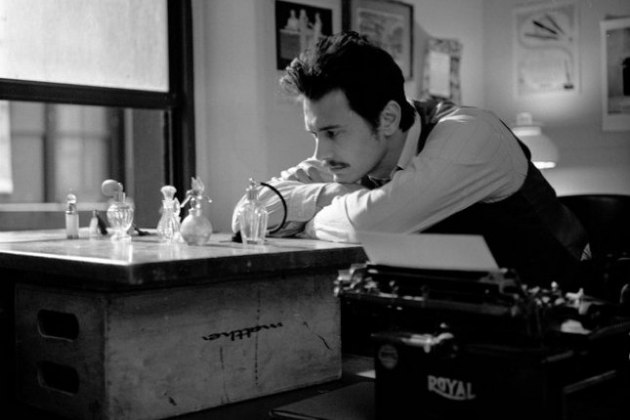There is something of the awfulness of an Ed Wood film about James Franco’s Hart Crane biopic, The Broken Tower, except that there’s not, not really. What made Ed Wood everybody’s favorite bad filmmaker was a fundamental joy underlying all of his projects, the thrill of making movies, even if the flying saucer was a paper plate dangling on a string, the dialog wooden, the plot preposterous. The dialog is wooden, the acting atrocious, the narrative movement non-existent in The Broken Tower, but its underlying sense is one of brooding pompousness. You’re cringing at the self-importance of it all from the first frame to the last.
The ultimate crime here is that nothing in this film gives you the sense that Hart Crane was an interesting or an important poet, let alone both. When his texts are presented as voice overs or as text on the screen, they’re too long and rushed – it’s impossible to absorb it all & the passages cited aren’t the ones that inspire an impulse toward further inspection. When Franco as Crane gives a reading, it’s so ponderous & Victorian that both my wife & I nodded off before it was over. Indeed, the impact is so different from Franco’s quite moving reading of Howl in his role as Allen Ginsberg in the Rob Epstein-Jeffrey Friedman film of that name that it’s shocking. The two readings should be studied by film students so that they can understand why an actor is so often better off in the hands of another director, even relative novices to dramatic filmmaking like the documentarians Epstein & Friedman. We’ll get to see Franco try it all a different way when Franco stars as CK Williams (I kid you not) in the forthcoming Tar, a film with nine – count ‘em – directors.
What makes Hart Crane a master, the reason to read him, is that he was the one great conservative poet of his generation to really take on the challenge posed by Pound, Eliot, Williams, Dos Passos, Joyce & Stein of bringing the 20th century into the work – The Bridge may have been a poem born to fail, but its ambition is limitless & its failures grand. Contrasted with the aesthetic laziness of Stevens or the self-compromises of Marianne Moore, Crane’s sense of the particular & fundamental agreement with Pound on the question of condensare make him a poet of much greater depth than any of that cohort who conjured up a sort of a Chicken Modernism as their substitute for the real deal.
All of that is lost in The Broken Tower – it may have been missing from the Paul Mariani book (from which Franco wrote the screenplay) as well: you never got any sense from Mariani's Williams biography why anyone would read William Carlos Williams either. What you get here instead is the tale of a gay rich kid from Cleveland who repeatedly attempts to kill himself in the most visually uninteresting ways possible and spouts seemingly random comments about writing positively about the burgeoning technological innovations of the new century – an aesthetic optimism that is nowhere else to be found in this film. There is about 15 seconds of graphic oral sex to give you the sense that this is a film committed to its aesthetics, but it’s also in keeping with the film’s sense of itself as one big vanity project. Franco’s mother plays Hart Crane’s mother, his better-looking younger brother plays the young Hart Crane. Given that Dave Franco is only seven years younger than James – and looks more like Montgomery Clift than his brother – his role as the younger Crane can’t be justified cinematically (tho he might have been a more interesting choice for the lead role overall).
Not that this film is entirely without its moments. There are two. The first is the initial suicide scene when young Crane swallows something bad and goes to die in a moonlit cow pasture, failing to expire as a cow stands over him and slobbers. The second is Franco being Crane as a young drone in an ad agency in New York, thinking about how to promote naugahyde, repeating the word over & over in increasingly weird enunciations until it becomes a sound poem all its own. This may be an acting school set piece – improvise an entire scene around a single word – but these are also the only moments in the entire picture where a twinkle of humor is allowed to leaven the proceedings.
Franco has directed other films previously, but The Broken Tower is the first to go into any sort of commercial distribution. Tower played at the LA Film Festival last year, showed at one or two art theaters & went straight to video-on-demand and Netflix. If you’re a completest on the presentation of poetry on film, this would be worth considering. But be forewarned.






